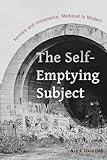The Self-Emptying Subject : Kenosis and Immanence, Medieval to Modern / Alex Dubilet.
Material type: TextPublisher: New York, NY : Fordham University Press, [2018]Copyright date: ©2018Description: 1 online resource (256 p.)Content type:
TextPublisher: New York, NY : Fordham University Press, [2018]Copyright date: ©2018Description: 1 online resource (256 p.)Content type: - 9780823279463
- 9780823279494
- 141.3 23
- online - DeGruyter
- Issued also in print.
| Item type | Current library | Call number | URL | Status | Notes | Barcode | |
|---|---|---|---|---|---|---|---|
 eBook
eBook
|
Biblioteca "Angelicum" Pont. Univ. S.Tommaso d'Aquino Nuvola online | online - DeGruyter (Browse shelf(Opens below)) | Online access | Not for loan (Accesso limitato) | Accesso per gli utenti autorizzati / Access for authorized users | (dgr)9780823279494 |
Browsing Biblioteca "Angelicum" Pont. Univ. S.Tommaso d'Aquino shelves, Shelving location: Nuvola online Close shelf browser (Hides shelf browser)

|

|

|

|

|

|

|
||
| online - DeGruyter Napoli/New York/Hollywood : Film between Italy and the United States / | online - DeGruyter Latinx Literature Unbound : Undoing Ethnic Expectation / | online - DeGruyter On the Nature of Marx's Things : Translation as Necrophilology / | online - DeGruyter The Self-Emptying Subject : Kenosis and Immanence, Medieval to Modern / | online - DeGruyter Eco-Deconstruction : Derrida and Environmental Philosophy / | online - DeGruyter Last Things : Disastrous Form from Kant to Hujar / | online - DeGruyter Power of Gentleness : Meditations on the Risk of Living / |
Frontmatter -- Contents -- Introduction -- 1. Meister Eckhart's Kenotic Lexicon and the Critique of Finitude -- 2. Conceptual Experimentation with the Divine -- 3. From Estrangement to Entäußerung: Undoing the Unhappy Consciousness in the Phenomenology of Spirit -- 4. Hegel's Annihilation of Finitude -- 5. Sans Emploi, Sans Repos, Sans Réponse: Georges Bataille's Loss without a Why -- Conclusion -- Acknowledgments -- Notes -- Index
restricted access online access with authorization star
http://purl.org/coar/access_right/c_16ec
Against the two dominant ethical paradigms of continental philosophy-Emmanuel Levinas's ethics of the Other and Michel Foucault's ethics of self-cultivation-The Self-Emptying Subject theorizes an ethics of self-emptying, or kenosis, that reveals the immanence of an impersonal and dispossessed life "without a why." Rather than aligning immanence with the enclosures of the subject, The Self-Emptying Subject engages the history of Christian mystical theology, modern philosophy, and contemporary theories of the subject to rethink immanence as what precedes and exceeds the very difference between the (human) self and the (divine) other, between the subject and transcendence. By arguing that transcendence operates and subjects life in secular no less than in religious domains, this book challenges the dominant distribution of concepts in contemporary theoretical discourse, which insists on associating transcendence exclusively with religion and theology and immanence exclusively with modern secularity and philosophy.The Self-Emptying Subject argues that it is important to resist framing the relationship between medieval theology and modern philosophy as a transition from the affirmation of divine transcendence to the establishment of autonomous subjects. Through an engagement with Meister Eckhart, G.W.F. Hegel, and Georges Bataille, it uncovers a medieval theological discourse that rejects the primacy of pious subjects and the transcendence of God (Eckhart); retrieves a modern philosophical discourse that critiques the creation of self-standing subjects through a speculative re-writing of the concepts of Christian theology (Hegel); and explores a discursive site that demonstrates the subjecting effects of transcendence across theological and philosophical operations and archives (Bataille). Taken together, these interpretations suggest that if we suspend the antagonistic relationship between theological and philosophical discourses, and decenter our periodizing assumptions and practices, we might encounter a yet unmapped theoretical fecundity of self-emptying that frees life from transcendent powers that incessantly subject it for their own ends.
Issued also in print.
Mode of access: Internet via World Wide Web.
In English.
Description based on online resource; title from PDF title page (publisher's Web site, viewed 02. Mrz 2022)


